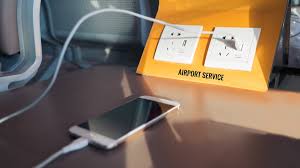 Keep Your Data Safe at an Airport – Avoid Juice Jacking!
Keep Your Data Safe at an Airport – Avoid Juice Jacking!
If you’re not careful about how you connect to Wi-Fi when you travel, you could be exposing your personal information to hackers. In fact, when you connect to free Wi-Fi at an airport, there are hackers trolling these connections and sometimes impersonating the networks. They want to get access to your credit card numbers, bank accounts, and other sensitive information.
How do they do it? They create fake networks that are named very similarly to the official airport networks. If you connect to one of these networks, they can spy on everything you do on your device. Whether it be a cell phone, tablet, or laptop, hackers can get into it.
In fact, anytime you connect to a certified airport network with no password, all of your data is sent to that network. Basically, anyone who wants to listen in can transmit data from your computer or phone across that network.

Avoid Juice Jacking!
Juice Jacking is when you use a public charging station to charge your phone, and a bad actor (hacker) uses it to steal data or load malware on your phone or device. Essentially, it’s a cyberattack.
Avoid plugging into random USBs and bring your own plug gear for outlets.
 If you need to get on the internet at an airport, be proactive and use these suggested tips to keep your data safe and still enjoy your trip:
If you need to get on the internet at an airport, be proactive and use these suggested tips to keep your data safe and still enjoy your trip:
- Forgo the airport network entirely. Use your cell phone’s hotspot feature.
- Use a Virtual Private Network (VPN). They slow down data speed, but make public Wi-Fi safer by ensuring that everything you do can’t be seen or modified by hackers.
- Enable multi-factor authentication
- Log out of apps when you are done using them. It’s harder for bad guys to get in if you are logged out.
Before you travel
- Backup your data in the cloud or on a portable hard drive.
- Use unique passwords. Include symbols and numbers.
Finally, make sure no one is “shoulder-surfing” (sitting behind you looking over your shoulder) your device content. Try using a security screen or lower the brightness to minimize visualization.
